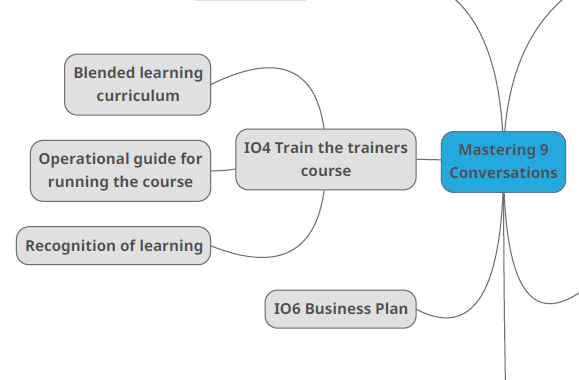
Aims
The goal of the M9C course is to empower volunteer and professional staff to be able to deliver the enhanced 9 Conversations programme. The training course will use the Business Model Canvas approach to support participants in their production of a business plan for the implementation of the 9 Conversations programme in their home area as a social enterprise.
Target Groups
The target group will be people who work with refugee groups and wish to help the small subsection of refugees who wish to start a business as an alternative to employment, which is often hard to get. This is for volunteers or staff who may run a M9C group on an occasional basis, perhaps once or twice a year and who do not have the confidence to simply pick up the 9C materials and start.
Learning Outcomes
We base the learning outcomes on the tasks involved in offering a 9 Conversations programme.
By the end of the training the participants should be able to
- Produce a localised business model canvas for offering the 9 Conversations training in their area and/or organisation.
- Be familiar with the materials of the 9 Conversations training old and new (either to facilitate it themselves or to be able to support others in facilitating the programme)
- Know how to lead each 9 Conversations session using the suggested process (either to facilitate it themselves or to be able to support others in facilitating the programme) includes administration of badges, suggested tools such as EU Skills Profile and the app and curation of materials.
Course structure
What we propose is a 9-unit course that mirrors the 9 Conversations course itself and the nine chapters of the Facilitation Guide. This means that each unit consists of a review of one of the Facilitation Guide chapters and its implications for implementing the 9 Conversations course in the participant’s organisation and a review of one of the 9 Conversations steps to ensure that the materials are understood, how they need to be adapted to the local context and any specific skills relevant to that step. There is not necessarily a logical connection between each side of the table. In the end, the course is working towards a coherent whole and all aspects will be needed.
| Unit | Facilitator Guide chapter | 9 Conversations programme step |
| 1 | What, why, who and how? | Introduction to the Business Model Canvas |
| 2 | Group guide skills | Your skills |
| 3 | Getting ready | The local business landscape |
| 4 | What is the BMC | Value Proposition and Customers |
| 5 | A typical session | Channels and relationships |
| 6 | The 9 Steps | Activities, resources and partners |
| 7 | Using slides and notes | Costs and income |
| 8 | Badges | Storytelling |
| 9 | What next? | Pitching |
The Covid 19 pandemic has shown us a course needs to be prepared for both 100% online and face to face versions.
Outputs
- M9C Train the facilitator handbook
- M9C course available for online, face to face and sample use
